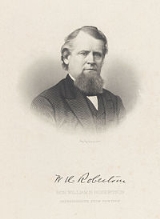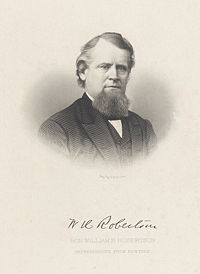
William H. Robertson
Encyclopedia

Bedford (town), New York
Bedford is a town in Westchester County, New York, USA. The population was 17,335 at the 2010 census.The Town of Bedford is located in the northeastern part of Westchester County, and contains the three hamlets of Bedford Hills, Bedford Village, and Katonah...
, Westchester County, New York
Westchester County, New York
Westchester County is a county located in the U.S. state of New York. Westchester covers an area of and has a population of 949,113 according to the 2010 Census, residing in 45 municipalities...
- December 6, 1898 Katonah
Katonah, New York
Katonah, New York is one of three unincorporated hamlets within the town of Bedford, Westchester County, New York, United States.-History:Katonah is named for Chief Katonah, an American Indian from whom the land of Bedford was purchased by a group of English colonists...
, Westchester County, New York
Westchester County, New York
Westchester County is a county located in the U.S. state of New York. Westchester covers an area of and has a population of 949,113 according to the 2010 Census, residing in 45 municipalities...
) was an American
United States
The United States of America is a federal constitutional republic comprising fifty states and a federal district...
lawyer and politician from New York
New York
New York is a state in the Northeastern region of the United States. It is the nation's third most populous state. New York is bordered by New Jersey and Pennsylvania to the south, and by Connecticut, Massachusetts and Vermont to the east...
. He was a United States Representative from 1867 to 1869, and President pro tempore of the New York State Senate
Majority Leader of the New York State Senate
The Majority Leader of the New York State Senate is elected by the majority of the members of the New York State Senate. The position usually coincides with the title of Temporary President of the State Senate, who presides over the session of the State Senate if the Lieutenant Governor of New York...
.
Life
He was the son of Henry Robertson (d. 1881). He received an academic education, studied law, and began practice in his native town.He was a Whig
Whig Party (United States)
The Whig Party was a political party of the United States during the era of Jacksonian democracy. Considered integral to the Second Party System and operating from the early 1830s to the mid-1850s, the party was formed in opposition to the policies of President Andrew Jackson and his Democratic...
member from Westchester County of the New York State Assembly
New York State Assembly
The New York State Assembly is the lower house of the New York State Legislature. The Assembly is composed of 150 members representing an equal number of districts, with each district having an average population of 128,652...
in 1849 and 1850. He was a member of the New York State Senate
New York State Senate
The New York State Senate is one of two houses in the New York State Legislature and has members each elected to two-year terms. There are no limits on the number of terms one may serve...
from 1854 to 1855. He was County Judge of Westchester County from 1856 to 1866. He joined the Republican Party
Republican Party (United States)
The Republican Party is one of the two major contemporary political parties in the United States, along with the Democratic Party. Founded by anti-slavery expansion activists in 1854, it is often called the GOP . The party's platform generally reflects American conservatism in the U.S...
upon its organization in 1855, and was a presidential elector in 1860.
He was elected as a Republican to the 40th United States Congress
40th United States Congress
The Fortieth United States Congress was a meeting of the legislative branch of the United States federal government, consisting of the United States Senate and the United States House of Representatives. It met in Washington, D.C. from March 4, 1867 to March 4, 1869, during the third and fourth...
, and served from March 4, 1867, to March 3, 1869. From 1872 to 1881 he was again a member of the State Senate. In 1874, after a constitutional amendment created it as a standing office, he was chosen the first President pro tempore of the New York State Senate
Majority Leader of the New York State Senate
The Majority Leader of the New York State Senate is elected by the majority of the members of the New York State Senate. The position usually coincides with the title of Temporary President of the State Senate, who presides over the session of the State Senate if the Lieutenant Governor of New York...
. He remained on this post until his retirement from the Senate in May 1881 upon his federal appointment.
In 1881, he was appointed Collector of the Port of New York
Collector of the Port of New York
The Collector of Customs at the Port of New York, most often referred to as Collector of the Port of New York, sometimes also as Collector of Customs for the Port of New York or Collector of Customs for the District of New York, was a federal officer who was in charge of the collection of import...
by President James Garfield
James Garfield
James Abram Garfield served as the 20th President of the United States, after completing nine consecutive terms in the U.S. House of Representatives. Garfield's accomplishments as President included a controversial resurgence of Presidential authority above Senatorial courtesy in executive...
whose nomination he had helped to secure by leading a part of the New York delegation at the 1880 Republican National Convention
1880 Republican National Convention
The 1880 Republican National Convention convened from June 2 to June 8, 1880 at the Interstate Exposition Building in Chicago, Illinois, United States, and nominated James A. Garfield and Chester A...
to desert the Grant
Ulysses S. Grant
Ulysses S. Grant was the 18th President of the United States as well as military commander during the Civil War and post-war Reconstruction periods. Under Grant's command, the Union Army defeated the Confederate military and ended the Confederate States of America...
column. Robertson's nomination to the collectorship, made without consulting the wishes of the two Republican U.S. Senators, Roscoe Conkling
Roscoe Conkling
Roscoe Conkling was a politician from New York who served both as a member of the United States House of Representatives and the United States Senate. He was the leader of the Stalwart faction of the Republican Party and the last person to refuse a U.S. Supreme Court appointment after he had...
and Thomas C. Platt
Thomas C. Platt
Thomas Collier Platt was a two-term member of the U.S. House of Representatives and a three-term U.S. Senator from New York in the years 1881 and 1897-1909 — is best known as the "political boss" of the Republican Party in New York State in the late 19th Century and early 20th Century...
, and, according to their claims, in violation of the President's pledge, was confirmed by the United States Senate
United States Senate
The United States Senate is the upper house of the bicameral legislature of the United States, and together with the United States House of Representatives comprises the United States Congress. The composition and powers of the Senate are established in Article One of the U.S. Constitution. Each...
, but it led to the resignation of the two Senators and resulted in a serious party split. In the bitter struggle between the Stalwart and the Half-Breed
Half-Breed (politics)
The "Half-Breeds" were a political faction of the United States Republican Party that existed in the late 19th century. The Half-Breeds were a moderate-wing group, and they were the opponents of the Stalwarts, the other main faction of the Republican Party. The main issue that separated the...
factions which followed, Robertson was active in the campaign that resulted in the election of new Senators in the place of Conkling and Platt. Robertson was a delegate to the 1884 Republican National Convention
1884 Republican National Convention
The 1884 Republican National Convention was a presidential nominating convention held at the Exposition Hall in Chicago, Illinois, on June 3–6, 1884. It resulted in the nomination of James G. Blaine and John A. Logan for President and Vice President of the United States. The ticket lost in the...
, and held the collectorship until 1885. Afterwards, he resumed his law practice.
He was again a member of the State Senate from 1888 to 1891.
Sources
- http://politicalgraveyard.com/bio/robertson.html Political Graveyard

